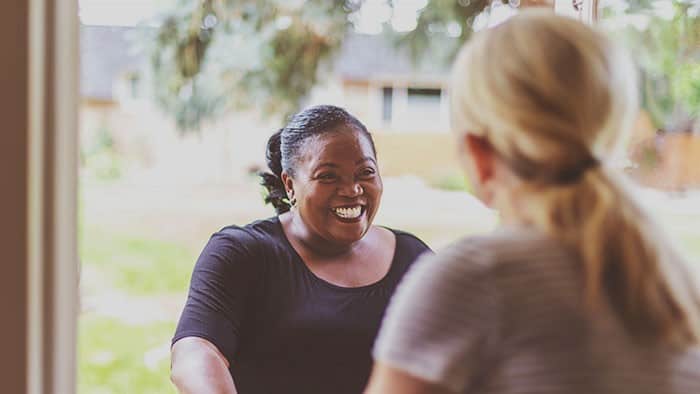Getting to know your neighbors is trending in the wrong direction. In 2019, Pew Research Center reported that 57% of Americans claimed to know some of their neighbors, and 26% said they knew most of their neighbors. These numbers might look better than you imagined. But when you dig into them, you get a clear sense of the trajectory.
When they asked people over 65 about their neighbors, 56% said they knew some of them, 34% said they knew most of them, and only 4% admitted they didn’t know any. When they asked the 18-29 demographic, 54% said they knew some of them, 20% said they knew all their neighbors, and 23% said they didn’t know any of the people around them.
Now take a moment to ask yourself the same questions:
- Do you know most of your neighbors?
- Do you know some of your neighbors?
- Do you know any of your neighbors?
For the Christian, getting to know your neighbors is important. Let’s examine why.
The practical value of knowing your neighbors
There are so many practical benefits to knowing the people who live around you. A 2018 study in the journal City & Community found that being engaged and connected to the people who live around you leads to increased satisfaction.
In our contemporary culture, people experience increased levels of fear and isolation. On top of that, they increasingly suffer from a lack of social support. All of these feelings lead to anxiety and dissatisfaction. Developing relationships with neighbors actually diminishes those emotions.
Simply knowing one’s neighbors makes one feel more secure and cared for. People are more apt to ask for help, advice, or assistance when they’ve had a few interactions with one another. By merely having conversations with the people in your neighborhood, you create a safety net where people feel more comfortable relying on each other.
While all of that is good, it applies to everyone regardless of their beliefs. Why is neighboring so essential for Christians?
The importance of loving your neighbors
Jesus famously commanded that we love our neighbor. The Pharisees pushed Jesus to define who our neighbor was, and He responded with the Parable of the Good Samaritan. His point was that our neighborhood was as wide as the love of God, and anyone in need was our neighbor.
And while that’s entirely true, the classical definition of “neighbor” still matters. And if we can’t learn to care about the people closest to us every day, we’ll never really love the random people we come across in our daily lives.
To be effective witnesses to our neighbors, we need to invest in relationships. This means getting to know about them and their lives. It means reaching out to them when we need help so that they know they can reach out to us when they’re in need. As we develop genuine relationships with the people around us, our influence grows. And that influence makes them more receptive when we share our testimonies or invite them to church gatherings.
Tips for getting to know your neighbors
Getting to know the people who live around you should be easy, but we’re all a little out of practice. So how do you break the ice and start the process? Here are a few tips:
- Introduce yourself and learn their name.
- Don’t pass up the opportunity for a greeting, even if it’s just a wave.
- Notice things that you might comment on later to get a conversation going. Maybe they have flowers in bloom or a dog that they walk.
- Look for opportunities to help. If they’re carrying in groceries or raking up leaves, offer to lend a hand. They might not take you up on it, but your willingness to help will have an impact.
- Offer them baked goods or bakery treats. Find little ways to bless them, and let them know that you think about them.
- Reach out when you need help. Maybe it’s just to borrow butter or sugar. As awkward as it might feel to make yourself vulnerable and risk rejection, asking for help is an excellent way to get to know someone and make them comfortable asking for assistance later.
As Christians, Jesus calls us to fulfill the Great Commission. And while we shouldn’t merely think of loving our neighbors as an evangelism strategy, it will make it easier to have conversations of eternal consequence if we already have a relationship with them.
If the idea of talking to your neighbors about Jesus freaks you out, don’t fret. Check out the article How to Get Better Equipped to Share Your Faith and see if getting better prepared doesn’t improve your confidence level!
